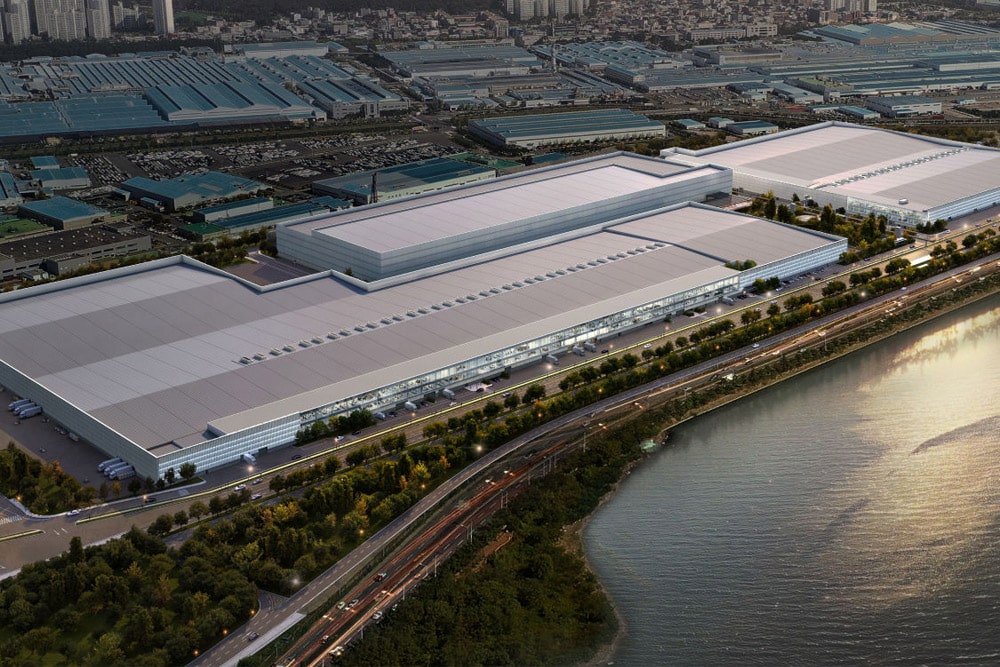Construction kicks off at Hyundai’s all-electric car plant in Ulsan
At the groundbreaking ceremony, Hyundai announced that construction will be completed in 2025 and production will start in the first quarter of 2026. The first model to be produced at the new plant will be an electric SUV from Hyundai’s Genesis brand.
There is little information about the plant so far. Korean media reported a few details in spring, citing official statements exchanged between Hyundai management and South Korea’s Finance Minister Choo Kyung-ho during a plant tour. At that time, for example, there was already talk of an investment volume of KRW 2 trillion (EUR 1.42 billion). The Hyundai Group has now confirmed this sum. There are discrepancies in the information on production capacity and site size. According to current information, the plant can manufacture up to 200,000 EVs instead of 150,000. The complex will be part of a 548,000-square-metre site in Ulsan. Previously, there was talk of a factory area of 230,000 square metres.
The plant will be built at the former Hyundai Motor test site. The new building will be Hyundai’s first new plant in its home country in 29 years. The last inauguration of a production facility (the one in Asan) dates back to 1996.
A new development from the Hyundai Motor Group Innovation Centre in Singapore (HMGICS) will serve as the production platform for the future electric car plant. “HMGICS’ manufacturing innovation platform includes demand-driven, AI-based intelligent control systems; eco-friendly, low-carbon construction methods to achieve carbon neutrality and RE100 certification (100 per cent renewable energy use); and human-friendly facilities that enable safe, efficient working,” the South Koreans write in their statement to the press. Other keywords include an intelligent logistics system (including automated parts logistics) and a flexible production system. The latter will help diversify vehicle models and enable the Group to respond to global market changes.
“Just as the dream of building the best car in the past made Ulsan an automotive city today, I trust Ulsan will be an innovative mobility city that leads the way in the era of electrification, starting with a dedicated EV plant,” said Euisun Chung, Executive Chair of Hyundai Motor Group, at the groundbreaking ceremony.
South Korea’s First Vice Minister of Trade, Industry and Energy, Young-jin Jang, commented: “I believe that Hyundai Motor will stand out as a powerhouse in the electric vehicle era with decisive investments. The government will prioritize supporting the improvement of the business investment environment, including bold tax incentives and eliminate regulations that inhibit economic growth.”
In April, Group subsidiary Kia also announced that it would begin constructing a new plant to produce electric purpose-built vehicles (PBVs). It, too, will be operational in the second half of 2025 with an annual capacity of 150,000 electric cars. The PBV factory will be built on the site of the Kia Hwaseong plant in Gyeonggi province.
The Hyundai Motor Group presented extensive investment plans in April to become one of the world’s top three electric car manufacturers by 2030. To this end, the South Korean company plans to invest up to 24 trillion won (equivalent to around 16.6 billion euros) to increase production and exports. The Group, with the brands Hyundai Motor, Kia and the supplier Hyundai Mobis, specifically aims to offer 31 electric models, whereby a large proportion of the battery-electric cars will be built in South Korea.
Part of the announced 24 trillion won (previously, there was talk of 21 trillion won) will also be spent on developing a new EV platform. It is called eM and will be debuting in 2025. According to an earlier announcement, the eM platform will be the basis for electric cars “in all segments” (i.e. from small cars to five-metre-long saloons and SUVs) and will offer a 50 per cent greater range than the Group’s current EVs. Based on the EV GMP vehicles Ioniq 5 and Ioniq 6, this would mean around 750 kilometres for the mid-size crossover and 900 kilometres for the mid-size sedan – based on the current WLTP ranges of 507 and 610 kilometres, respectively.
Hyundai Motor’s Ulsan plant initially served as an assembly factory when it was founded in 1968. Mass production of its first model, the Pony, began in 1975, and the Hyundai Ulsan plant is now the largest single plant in the world.





0 Comments